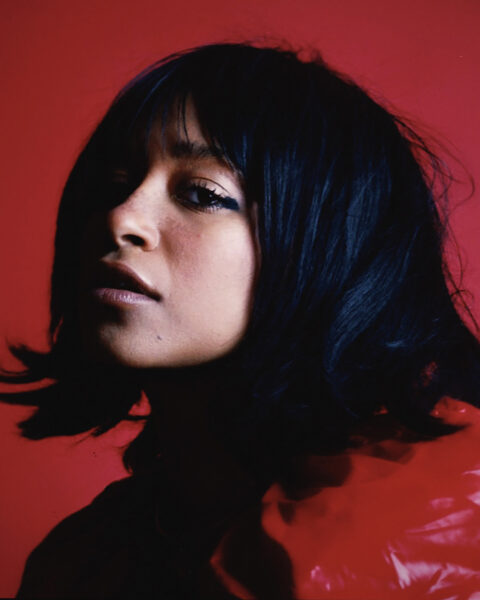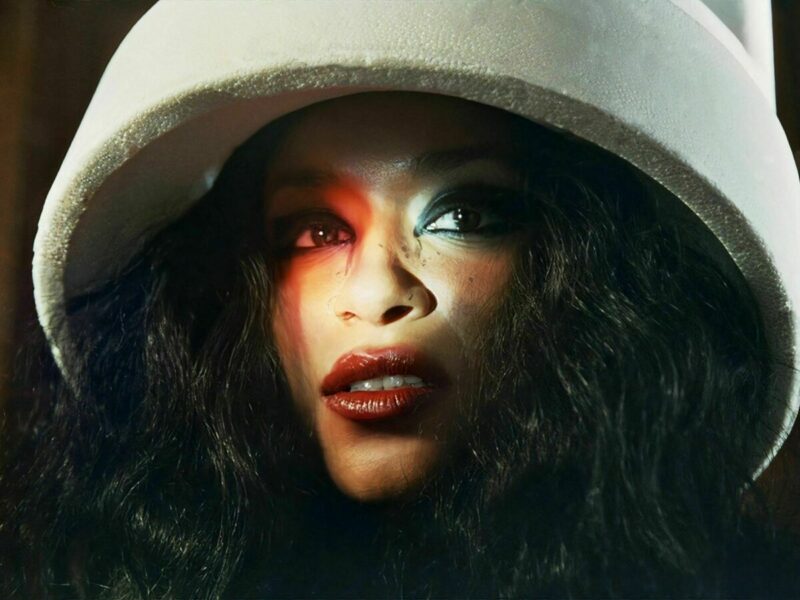One voice becomes two. Then four. It multiplies, then catalyzes layers of vocals into one distortion-ridden howl. Nuha Ruby Ra exhales into the two microphones pressed to her lips. The dark room shakes. Watching the artist perform feels like being invited to the coolest underground happening at the moment. When I saw her at Reeperbahn Festival back in September of last year, the singer was performing some of the songs that are now being released on the new EP Machine Like Me.
Phoning from her London base, Nuha is eager to share thoughts on her creation and bubbles away as I ask about the themes on the record. Coming from a background in visual arts and sound art, Nuha Ruby Ra makes music that transcends the mere aural. Playing with vocal textures and distortion, she is nothing short of an experimental artist forming sculptures of sound, breaking things down into their single elements, and reassembling them.
How to Move
 These sound collages pluck apart listening conventions in ways that are almost violent to the ear. But mustn’t there be violence in order to destruct and reconstruct? “In How To Move there was a lot of violence, I guess,” Nuha Ruby Ra comments, attributing the violent character rather to her former EP. “It came from a tormented place, a place of anguish and spiritual violence.” Following the heaviness of How to Move, the artist initially set out to make a dance record. “[The previous record] needed to be heavy. That was where I was at. Now I wanted to have something more contrasting and celebratory. More open.”
These sound collages pluck apart listening conventions in ways that are almost violent to the ear. But mustn’t there be violence in order to destruct and reconstruct? “In How To Move there was a lot of violence, I guess,” Nuha Ruby Ra comments, attributing the violent character rather to her former EP. “It came from a tormented place, a place of anguish and spiritual violence.” Following the heaviness of How to Move, the artist initially set out to make a dance record. “[The previous record] needed to be heavy. That was where I was at. Now I wanted to have something more contrasting and celebratory. More open.”
A new chapter, Nuha Ruby Ra calls it. And it makes sense, sonically. How to Move tears you apart and Machine Like Me allows the process of a new creation to start again. There was also a lot more playfulness in the making of the current EP. The artist decided to play every instrument herself. That led to interesting non-conventional handling of their sonic makeup. The architecture of the songs themselves is shaped by this loose approach and listening closely you can hear the different explorations that flowed into each of the tracks.
Playfulness of Machines
Still, taking Nuha Ruby Ra as an artist who makes music lightheartedly would go off on the wrong tangent. While there is an increased playfulness to the new EP, it applies to the explorative sonic structure and approach of the songs rather than the lightness of the topic. The title highlights this ambiguity. The robotic connotation of the machine and the described new playfulness seem like juxtaposed concepts. Putting herself behind every instrument, Nuha Ruby Ra becomes the playful machine. On Six in the Morning, this sounds like there is a full band recording in the studio with Nuha when in reality it is just one creative mind playing around with a bunch of different instruments.
“I wanted a playfulness coming from a childlike sense of exploration rather than a lightheartedness.”
 The record and its title have grown from the long stretch of touring that Nuha has put behind her in the last years. “At some point, it felt like I was just a fucking machine. There is a dark humor in Machine Like Me. It came from me constantly running without being able to stop and look around. You’re doing the thing and you cannot stop. Around the time when I came up with the title I was in that place, and it was very challenging. It felt even masochistic in some way being weirdly proud of how much you can push yourself.” The title is a description of that moment and a comment on the state of the music industry engulfed by the capitalist mentality of having to sacrifice yourself for your work.
The record and its title have grown from the long stretch of touring that Nuha has put behind her in the last years. “At some point, it felt like I was just a fucking machine. There is a dark humor in Machine Like Me. It came from me constantly running without being able to stop and look around. You’re doing the thing and you cannot stop. Around the time when I came up with the title I was in that place, and it was very challenging. It felt even masochistic in some way being weirdly proud of how much you can push yourself.” The title is a description of that moment and a comment on the state of the music industry engulfed by the capitalist mentality of having to sacrifice yourself for your work.
Place of Peace
During our conversation in early 2023, the artist tells me about finally feeling less burned out after taking some time to slow down. Still, Nuha Ruby Ra describes herself as a “mentally overactive mind”, which leads her to feel burnt out a lot. “My brain races for different reasons. When things go in overdrive it is really intense. Having time to ground is important for my mental health.” With that newfound energy, Nuha explains that she was able to move forward to the new chapter from a good place rather than the burnt-out, tired, and confused state that the previous release came from. “I am inviting some stillness in”, she says.
A Thousand Self-Portraits
Machine Like Me and How to Move both draw from intensely personal moments. Exploring her visual arts background, Self-Portraiture is a particularly striking example of Nuha’s personal songwriting. She is playing with distorted representations of herself on a lyrical and visual level. The EP represents this collage of several self-portraits starting from its production entirely by the musician herself. Visually, Nuha Ruby Ra also explores different versions of herself in the myriad of personas in the music video to Self-Portraiture.
“In music, I am giving all the different versions and parts of myself space. there are different parts of me more alive at different times and others more dormant. I enjoy the practice of indulging different sides.”
The subject of self-portraiture is especially interesting to Nuha Ruby Ra because of her background in fine arts. During her time at art school, self-portraiture was intensively studied from a visual arts and art history perspective. “Today you have this new sense of self-obsession through the spectrum of looking at and representing oneself on social media,” Nuha comments. “To me the self-portraiture on the record is me having fun and crossing between the two realms of what it is to present yourself to the world and the actual self.”
(De)Construction
Like a performance piece or a work of visual art, the record remixed, distorts, and diffuses parts of an artist and her artistic vision. Bending her creative background from visual arts to music, Nuha Ruby Ra eludes conventions and paints abstractly. With broad vocal brushstrokes and multi-faceted projections of musical arrangements, Machine Like Me unfolds like a well-curated exhibition taking you from one room to another, each entirely different yet somehow connected to the previous. Painting to digital art, collage to performance, spoken word to noisy instrumentation.

Photo by Billie Turnbull
Thinking of destruction and deconstruction, Nuha Ruby Ra describes the sound of machinery as the soundtrack to her life for the past years. As we are talking, I can hear the construction site outside of her London warehouse home. Living in one of the areas undergoing massive renovation and gentrification, the community and creative spaces are torn down to make way for expensive apartment blocks. When Nuha moved to the area, she described it as incredibly inspiring but over the years the neighborhood has been reshaped by major constructions. “Construction and deconstruction are part of my daily life”, she says, not only referring to the constant noise from the outside. “It is how I operate too in a lot of ways. Making new things out of old things and working with found materials is kind of what makes the foundation of my practice”.
Full Circle
“I like the idea of building something and then sort of taking it apart again or using different parts of it to build something else”. This approach is mirrored in the new EP as well. Cruel Ending for example is a different construction of Cruel. Opening and closing the record, the songs draw a line from one end to the other, both driven by the same bass line.
Towards the end of the song comes a moment that Nuha describes as “the resolve of the whole record”. The pieces of the songs and their sonic architecture can exist in various shapes, like the artist herself. Machine Like Me explores this creative fragmentation and uses music to take apart, dissect, and reshape the energy, melodies, words, and ideas driving Nuha Ruby Ra as an artist.
Machine Like Me is out on March 17th.



